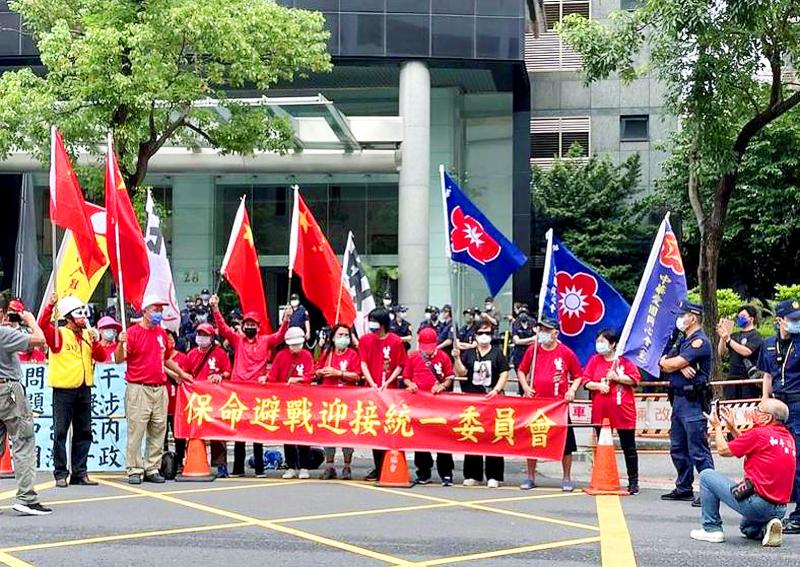A national security official earlier this week warned of Beijing’s “trifecta” strategy of intimidating other countries, after Japan was rebuked for reportedly planning to station an active-duty defense attache at the Japan-Taiwan Exchange Association over the summer.
The Sankei Shimbun on June 4 reported that the Japanese Ministry of Defense was for the first time considering dispatching a serving civilian rather than a retired official to the association amid intensifying Chinese pressure in the Taiwan Strait.
Tokyo has traditionally sent a retired military officer to serve as an unofficial liaison at the association, the newspaper said.

Photo courtesy of a reader
Although Tokyo declined to comment officially on the matter, Japanese Minister of Defense Nobuo Kishi shared the report on Facebook in what has been interpreted as passive confirmation.
Chinese Central Foreign Affairs Commission Director Yang Jiechi (楊潔篪) on June 7 called Japanese National Security Secretariat Director-General Takeo Akiba.
“Old and new issues are intertwined in China-Japan relations, and difficulties and challenges cannot be ignored,” a Chinese ministry statement quoted Yang as saying during the call.
The Chinese state-run Global Times on the same day ran an editorial urging Beijing to “give Japan a blow to the head to wake it up” over its rumored “rupture” of existing post-World War II diplomatic arrangements with Taiwan.
The newspaper followed that up with another editorial accusing the association of making “small moves” over its 50-year history “carefully calculated to test China’s bottom line.”
Listing its supposed “crimes,” the article gave the association’s address in Taipei and included a photograph of the representative’s business card with a red “X” over his title of “ambassador.”
It also said that “whenever someone on the island expresses discontent with Japan, the association becomes an outlet for their anger.”
A group of Taiwanese unification supporters the next day gathered in front of the association’s office carrying banners protesting Tokyo’s “interference in internal affairs.”
The three events — the call to the Japanese minister, the editorials and the protest — were orchestrated to put pressure on Japan, a national security official said on condition of anonymity.
Yang threatened Tokyo in the phone call, which was cited in a Global Times article maligning the association, they said.
Protesters followed the article’s instruction to organize a “coincidental protest,” incited by the newspaper’s “inflammatory language,” the person added.
Chinese harassment of foreign diplomatic missions is nothing new, the official said, citing another case from earlier this month in which a post promoted on Chinese social media allegedly quoted two US diplomats in Guangzhou as saying that the “hype” around human rights abuses in Xinjiang was “fabricated.”

Trips for more than 100,000 international and domestic air travelers could be disrupted as China launches a military exercise around Taiwan today, Taiwan’s Civil Aviation Administration (CAA) said yesterday. The exercise could affect nearly 900 flights scheduled to enter the Taipei Flight Information Region (FIR) during the exercise window, it added. A notice issued by the Chinese Civil Aviation Administration showed there would be seven temporary zones around the Taiwan Strait which would be used for live-fire exercises, lasting from 8am to 6pm today. All aircraft are prohibited from entering during exercise, it says. Taipei FIR has 14 international air routes and

Taiwan lacks effective and cost-efficient armaments to intercept rockets, making the planned “T-Dome” interception system necessary, two experts said on Tuesday. The concerns were raised after China’s military fired two waves of rockets during live-fire drills around Taiwan on Tuesday, part of two-day exercises code-named “Justice Mission 2025.” The first wave involved 17 rockets launched at 9am from Pingtan in China’s Fujian Province, according to Lieutenant General Hsieh Jih-sheng (謝日升) of the Office of the Deputy Chief of the General Staff for Intelligence at the Ministry of National Defense. Those rockets landed 70 nautical miles (129.6km) northeast of Keelung without flying over Taiwan,

City buses in Taipei and New Taipei City, as well as the Taipei MRT, would on Saturday begin accepting QR code payments from five electronic payment providers, the Taipei Department of Transportation said yesterday. The new option would allow passengers to use the “transportation QR code” feature from EasyWallet, iPass Money, iCash Pay, Jkopay or PXPay Plus. Passengers should open their preferred electronic payment app, select the “transportation code” — not the regular payment code — unlock it, and scan the code at ticket readers or gates, General Planning Division Director-General Liu Kuo-chu (劉國著) said. People should move through the

The Ministry of National Defense (MND) today released images of the military tracking China’s People's Liberation Army (PLA) movements during the latest round of Chinese drills around Taiwan. The PLA began "Justice Mission 2025" drills today, carrying out live-fire drills, simulated strikes on land and maritime targets, and exercises to blockade the nation's main ports. The exercises are to continue tomorrow, with the PLA announcing sea and air space restrictions for five zones around Taiwan for 10 hours starting from 8:30am. The ministry today released images showing a Chinese J-16 fighter jet tracked by a F-16V Block 20 jet and the